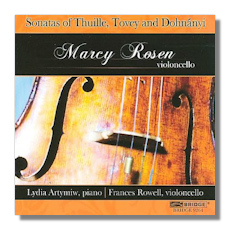
The Internet's Premier Classical Music Source
Related Links
-
Dohnányi Reviews
Thuille Reviews - Latest Reviews
- More Reviews
-
By Composer
-
Collections
DVD & Blu-ray
Books
Concert Reviews
Articles/Interviews
Software
Audio
Search Amazon
Recommended Links
Site News
 CD Review
CD Review
Turn-of-the-Century Cello Sonatas

- Ludwig Thuille: Sonata for Cello & Piano in D minor, Op. 22 1
- Donald Francis Tovey: Sonata for 2 Cellos in G Major 2
- Ernő Dohnányi: Cello Sonata in B Flat Major, Op. 8 3
1-3 Marcy Rosen, cello
2 Frances Rowell, cello
Lydia Artymiw, piano
Bridge BCD9264 DDD 74:30
Having recently reviewed yet another recording of Dvořák's Cello Concerto – Gautier Capuçon's, and it is a good one! (Virgin Classics 519035-2) – I found it pleasurable to turn to much less familiar music. All of these works were composed within a period of less than 15 years. The sonatas by Thuille and Dohnányi, at least, have been recorded before, but they're hardly familiar, and putting these three works together on the same CD gives collectors a convenient opportunity to explore them.
Ludwig Thuille was three years Richard Strauss's senior, and the two men became friends when they were children. (Don Juan was dedicated to Thuille.) As if to prove a point, cellist Sophie Rolland's AS&V recording of Thuille's sonata thoughtfully couples it with Strauss' sole work in this medium. Actually, I don't find Thuille's sonata, which was published in 1902, particularly Straussian, nor is it redolent of Wagner, whose spell Thuille fell under, thanks to Alexander Ritter. Thuille's most important mentor probably was Joseph Rheinberger – a fine craftsman, but hardly a firebrand. Thuille's sonata has its moments, notably in its songful middle movement, and overall is a solid work with a noble demeanor, and well worth an occasional airing – much like Rheinberger's music!
Tovey's writings as a musicologist have made it easy to forget that he was a composer too – one who was esteemed by the likes of Pablo Casals. Although Tovey lived into his sixties, he stopped composing more than 20 years earlier. In 1912, while staying on the Spanish coast with Casals and cellist Guilhermina Suggia, Tovey composed the Sonata for Two Cellos for his two hosts, who were romantically involved at the time. They esteemed Bach. That, and Casals' Catalan origins provided the seasoning for the sonata, which nevertheless is flavored by Tovey's overarching affinity for Brahms.
Best of all, to my ears, is the sonata by Ernst von (or simply "Ernö") Dohnányi. The work was inspired, in part, by the composer's cello-playing father, but it was dedicated to the cellist who first performed it – Ludwig Lebell, in 1899. As with Tovey's sonata, Brahms's influence can be felt, but here the level of invention is even higher. Particularly memorable – perhaps because it is a little repetitious, but not annoyingly so! – is the playful Scherzo. The last movement, itself a Theme and Variations, brings themes from the previous three movements together in a manner that feels perfectly natural.
Marcy Rosen is a new name to me, but she is a seasoned performer who graduated from the Curtis School of Music, and who has been very active since then as a soloist and chamber musician, and also as a mentor for a new generation of cellists. She plays these three works with personality, but without overwhelming them with ego. Similarly, her sound is warm but never ponderous, and she negotiates even the most rapid passages with no diminution in quality of tone. In the Tovey, she has an equal partner in cellist Frances Rowell – another name worth knowing better. In the other two sonatas, pianist Lydia Artymiw provides the expert and musically sensitive collaboration that one expects from her.
Bridge's warm and truthful recording, made at Queens College's Aaron Copland School of Music, places listeners at an ideal distance from the performers, and also ideally balances the performers. David Grayson's booklet notes are detailed, and add to one's appreciation of these works.
Copyright © 2009, Raymond Tuttle




















